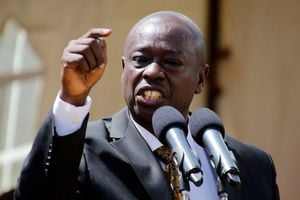
A herder looks after cattle in Laikipia County on January 8, 2017. Herders in the region will benefit from a Sh10 million tagging project undertaken by the Kenya Veterinary Association, County and national government and other stakeholders in an effort to curb cattle rustling in the region. PHOTO | MWANGI NDIRANGU | NMG
You would think that it is the easiest thing in the world to explain. Apparently, the government wants to vaccinate all livestock against foot and mouth disease and peste des petits ruminants for purposes of meeting the health requirements for meat and other animal exports into the Middle-East and European markets.
These diseases are bad news even under normal circumstances and farmers routinely give their cattle vaccines without government involvement.
So how did such a supposedly routine farm chore degenerate into a slugfest of intemperate language, abuse, a spirited resistance by farmers and, now that the Kenya Veterinary Association has called for the postponement of the entire exercise, a serious setback for the campaign?
First, there seems to be a cloud of disquiet hanging over the involvement of Mr Bill Gates, the Microsoft billionaire founder and philanthropist.
Mr Gates is close to the Kenya government for some reason and his organisation was recently granted a diplomatic status similar to that of representatives of countries, though the courts have since stepped in.
There is a worldwide debate about Covid-19 vaccines around the world with claims and counterclaims about their safety. The World Health Organization advocated the vaccines, which we all took, and argues that they saved lives.
For those who remember what happened in Italy, New York and other epicentres and the fact that Covid-19 appeared to just peter out after massive global vaccination, there is some reason to believe that the exercise saved lives.
Others still maintain that the vaccine was not properly tested, that the virus was made in the lab, and that prominent public health officials, especially in the US, ought to be put on trial.
Mr Gates being a prominent figure in an organisation that has invested in vaccine development, and a notable figure in the WHO, walks into many situations with the cloud of that controversy swirling around him, fairly or unfairly.
Then there is Mr Gates’ involvement with climate change, a campaign in which he is a notable leader and benefactor.
He has articulated the role of cattle in greenhouse gas emissions, specifically methane, as many farmers who have extracted biogas from animal droppings would know.
Cattle contribute about 3.5 per cent of all greenhouse emissions. Of course there are other things that could be done as a matter of priority, such as reducing the world’s oil addiction, to reduce greenhouse emissions, but cows are a factor too and they need some sort of attention. Mr Gates has advocated three solutions to this cow business.
First, is an artificial steak that he has described as delicious and healthier than natural steak, on account of having no cholesterol. The second solution that I have just heard about is a special artificial cattle feed that is allegedly being tested in the UK, which eliminated methane emissions in cattle fed on it. And finally is a vaccine that cures the greenhouse gas emissions in animals.
Kenyans have added two and two together and arrived at the vaccination against cattle wind. As a matter of fact, Kenyans are adding many two and twos and arriving at cow wind.
I saw one who took Livestock Principal Secretary Jonathan Mueke’s announcement that there is a facility to manufacture vaccines in Embakasi, added the national blackout and a cargo plane that landed in the dark, and got cow wind.
So how did we end up here? The vaccination, which should be a routine matter, was spearheaded and championed by the President himself. Because Kenyans are distrustful, the DC doing the sub-chief’s job makes them suspicious.
I’m willing to bet that if the matter had been delegated to the usual people who drive this kind of process, there may have been less suspicion. The fact that it was receiving the personal attention of the senior-most State official gave rise to suspicion that there was more to it than was being declared.
Secondly, a lot of government communication did not have the specifics of the vaccination drive. If indeed this was a campaign against foot and mouth, why not say so? If the vaccines were not coming from some US start-up and being flown into the country in darkness, why not make it clear that they would come from the Kenya Veterinary Vaccines Production Institute?
Government communication should identify the disease targeted by the vaccination, the name of the vaccine and the source of that vaccine. This allows the sceptical farmers to verify the facts for themselves and this builds confidence.
Finally the use of threats—such as the withdrawal of dipping services for farmers who don’t vaccinate—on a routine matter is completely unnecessary. One would have expected the focus to be to create demand for the service by convincing the consumer.
No one needs to be threatened to go for lunch, they know they need it. Equally, it is strange to force farmers to take the free vaccine.
They should be informed what diseases they should vaccinate against and they have the option to go to a properly registered vet and buy the vaccine or participate in the government campaign.
It really is a load of cow wind about nothing.
Mr Mathiu, a media consultant at Steward-Africa, is a former Editor-in-Chief of Nation Media Group. [email protected].







